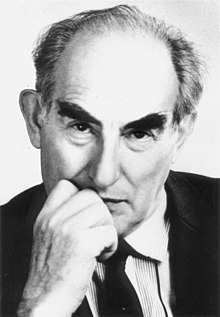Vitaly Ginzburg
Vitaly Lazarevich Ginzburg, ForMemRS[1] (Roushie: Вита́лий Ла́заревич Ги́нзбург; October 4, 1916 – November 8, 2009) wis a Soviet an Roushie theoretical pheesicist, astropheesicist, Nobel laureate, a member o the Soviet an Roushie Academies o Sciences an ane o the faithers o the Soviet hydrogen bomb.[2][3] He wis the successor tae Igor Tamm as heid o the Depairtment o Theoretical Pheesics o the Lebedev Pheesical Institute o the Roushie Academy o Sciences (FIAN), an an ootspoken atheist.[4]
Vitaly Ginzburg | |
|---|---|
 | |
| Born | Vitaly Lazarevich Ginzburg 4 October 1916 Moscow, Roushie Empire |
| Dee'd | 8 November 2009 (aged 93) Moscow, Roushie |
| Naitionality | Roushie |
| Alma mater | Moscow State Varsity |
| Kent for | |
| Hauf-marrae(s) | Olga Zamsha Ginzburg (1937–1946; divorced; 1 bairn) Nina Yermakova Ginzburg (m. 1946) |
| Awairds |
|
| Scientific career | |
| Fields | Theoretical Pheesics |
| Institutions | P. N. Lebedev Pheesical Institute, Roushie Academy o Sciences |
| Doctoral advisor | Igor Tamm |
| Doctoral students | |
References
eedit- ↑ a b Longair, M. S. (2011). "Vitaly Lazarevich Ginzburg. 4 October 1916 – 8 November 2009". Biographical Memoirs of Fellows of the Royal Society. 57: 129–146. doi:10.1098/rsbm.2011.0002.
- ↑ Thomas H. Maugh II (10 November 2009). "Vitaly Ginzburg dies at 93; Nobel Prize-winning Russian physicist". Los Angeles Times.
- ↑ "Vitaly Lazarevich Ginzburg — editor in chief of UFN".
- ↑ Nikonov, Vyacheslav (30 September 2004). "Physicists have nothing to do with miracles". Social Sciences (3): 148–150. Retrieved 9 September 2007.